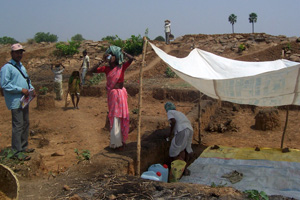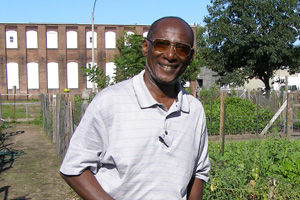Only a small number of governments have established meaningful and effective farmer-centred measures for the implementation of access and benefit sharing of genetic resources. One reason is the highly complex nature of the international regulatory system. This special issue of Farming Matters magazine presents practical ways in which access and benefit sharing for family farmers can be enhanced through collaborative efforts based on the rural realities, knowledge and needs of local communities. Key in this approach are community seed banks and farmer seed systems, which serve as local points of access to genetic resources as well as ensuring equitable sharing of benefits. This article presents an overview of both the ‘formal’ and ‘informal’ access and benefit sharing systems that are currently being used, and examines the theory and practice of these systems.
Institutionalising dialogue in Rwanda through innovation platforms
A platform of farmers, retailers and service providers,civil society organisations, NGOs, government officials, and researchers improves livelihoods in Rwanda. Through
interaction and collaboration, these groups experiment with various technological and institutional innovations, thereby tackling local agricultural challenges. This
experience illustrates the importance of institutionalising a space where knowledge can be co-created.
Perspectives: Strengthening people’s knowledge
For the past half century agricultural innovation has denied a voice to the many groups who work outside the profession of science – farmers, food providers, women and the urban poor. The value of their expertise gained through practical experience must be recognised in the production and validation of knowledge.
Fostering Young Professionals to Think Landscapes
From 1-4 December, 2015 Youth in Landscape Initiative workshop at Global Landscape Forum (GLF) in Paris was organized to guide 50 young innovators together to solve rights and tenure, finance and trade, restoration, measuring success, and education challenges. I was one of the 10 young innovators who worked on the Education Theme Landscape Challenge.
Strawberry fields forever
Professor Steve Gliessman and farmer Jim Cochran are among the movers and shakers of the strawberry sector in California. Since the 1980s they have been experimenting with sustainable ways to grow strawberries and with alternative food networks. Committed to the agroecological transition, they built a powerful farmer- researcher partnership that was groundbreaking for farmers, academia and the strawberry industry as a whole.
The world’s largest safety net for family farmers?
India’s Mahatma Gandhi National Rural Employment Guarantee Act (MGNREGA) is the largest public-works based employment programme in the world. Unanimously enacted by the Indian parliament in 2005, implementation began in February 2006. With an annual budget of six billion US dollars, it now supports some fifty million rural people – larger than the population of Senegal, Mali and Niger combined. This article focuses on the successes, issues and potential of the Act to improve the well being of workers and family farmers.
A systems approach against poverty
Opinion by Million Belay.
Why is poverty deepening in Africa even when millions of dollars continue to be poured in to alleviate it?, asks Million Belay. He answers by highlighting how we need to promote agroecology, treat agriculture as a system, and move away from green revolution approaches.
“A revolution of thought is necessary” – Interview with Cantave Jean-Baptiste
Interview > Cantave Jean-Baptiste is a Haitian agronomist and rural development practitioner with more than three decades of experience supporting sustainable agriculture and strengthening peasant organisations. He is Executive Director of Partenariat pour le Développement Local (PDL) in Haiti, and a founding member of Groundswell International. Farming Matters asked Mr Jean-Baptiste how family farmers can build resilience in Haiti, a country where an estimated 80% of the population lives in poverty.
Sustainable Way of Living – Homeschooling the Youth
Mainstream education has caused difficulties for the youth of northern Thailand in reaching their dreams. In most cases, they are forced to take exorbitant student loans which brings their families in poorer conditions.
This video proposes an alternative to mainstream education by home schooling the youth and teaching them the sustainable way of living. They are taught to live in a sufficiency economy model, consuming what they only need and driving themselves away from greed.
Climate Change and the Agriculture Crisis: Agroecology as a Solution (Hindi version)
This publication in Hindi tries to address important questions such as:
What exactly is the climate change crisis? How does it affect us? Are we causing it? How? How is it going to affecting our land, water, food and lifestyle? Can we anything about it ? How ? Why is the practice of agroecology so important in addition to clean energy?





